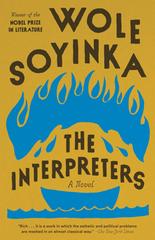 Wole Soyinka, the Nigerian playwright, poet, essayist, novelist and political activist, received the 1986 Nobel Prize in Literature--the first African writer to win the award. He was born to a Yoruba family in 1934, attended several schools in Nigeria and eventually graduated from the University of Leeds in England. Soyinka worked for the Royal Court Theatre in London and wrote plays that were produced in his native country and the U.K. While living in Nigeria during the Nigerian Civil War, he was arrested and spent two years in solitary confinement. He was forced to flee the country during the reign of General Sani Abacha in the 1990s. Soyinka's work has often been concerned with "the oppressive boot and the irrelevance of the colour of the foot that wears it." He has taught at Cornell, Emory, Oxford, Harvard and Yale Universities.
Wole Soyinka, the Nigerian playwright, poet, essayist, novelist and political activist, received the 1986 Nobel Prize in Literature--the first African writer to win the award. He was born to a Yoruba family in 1934, attended several schools in Nigeria and eventually graduated from the University of Leeds in England. Soyinka worked for the Royal Court Theatre in London and wrote plays that were produced in his native country and the U.K. While living in Nigeria during the Nigerian Civil War, he was arrested and spent two years in solitary confinement. He was forced to flee the country during the reign of General Sani Abacha in the 1990s. Soyinka's work has often been concerned with "the oppressive boot and the irrelevance of the colour of the foot that wears it." He has taught at Cornell, Emory, Oxford, Harvard and Yale Universities.
Soyinka's first novel, The Interpreters (1964), follows a disparate cast of characters in Lagos, Nigeria, between independence from British colonial rule and the Nigerian Civil War. His second novel, Season of Anomy (1972), is based on Soyinka's time in prison and examines how individuals can be agents for broader social change. New editions of both of these novels are available today from Vintage ($16.95). On September 28, Soyinka's first new novel in a half century, Chronicles from the Land of the Happiest People on Earth, will be published by Pantheon ($28). --Tobias Mutter

